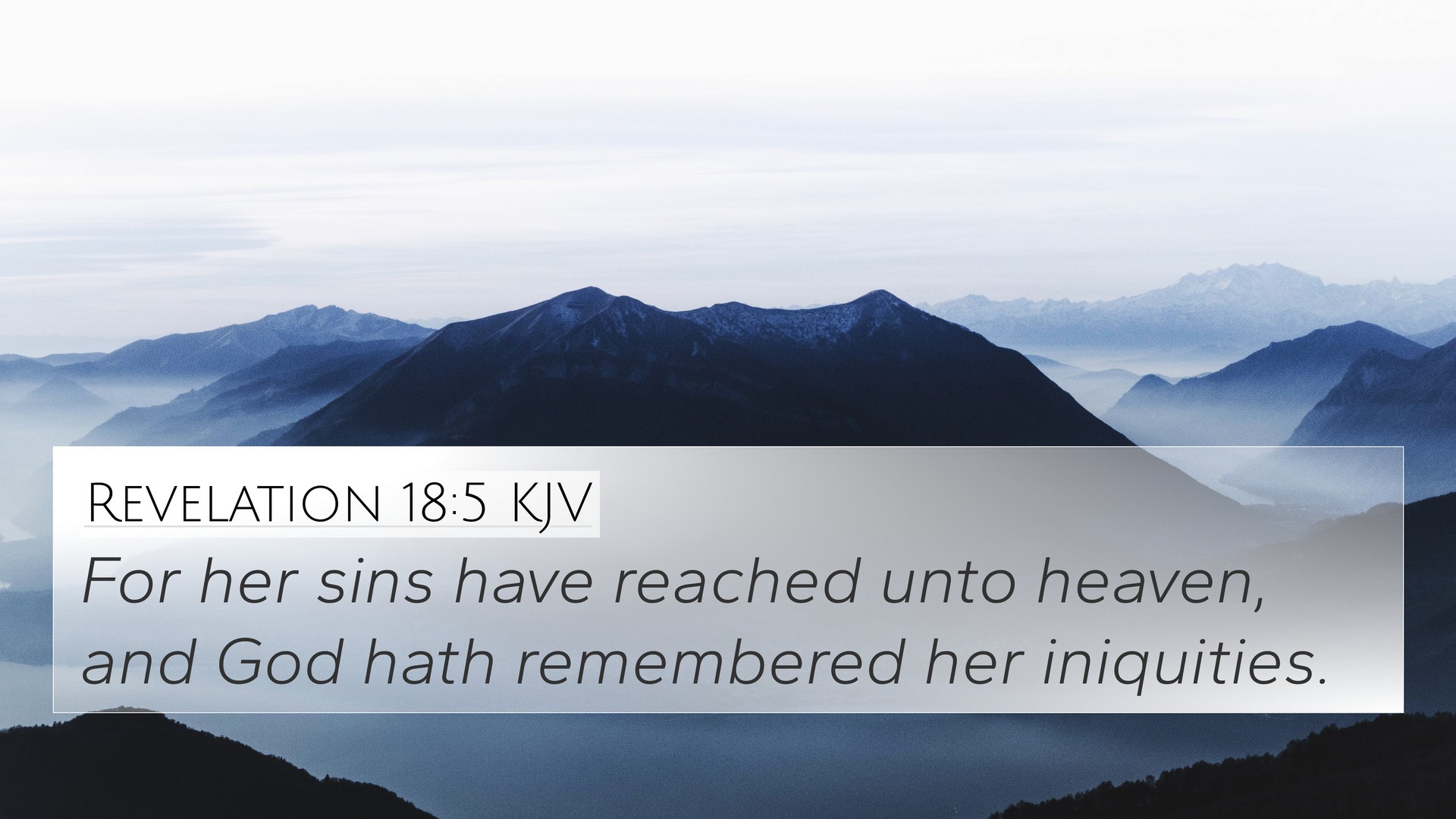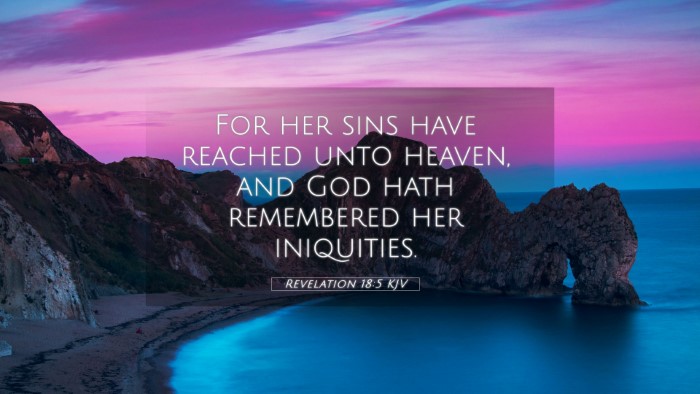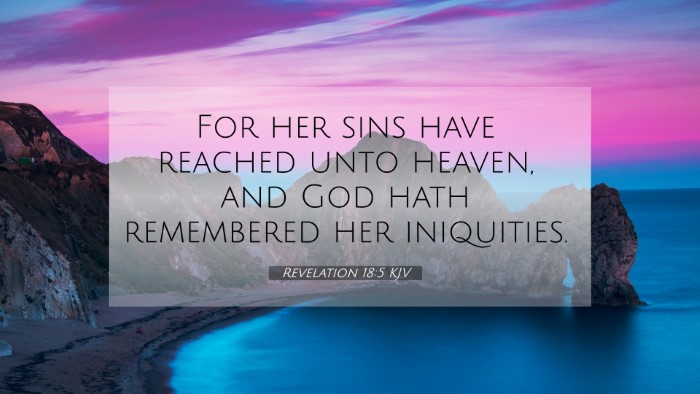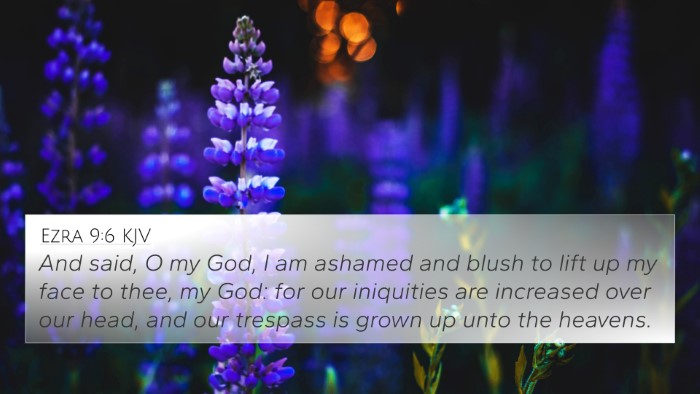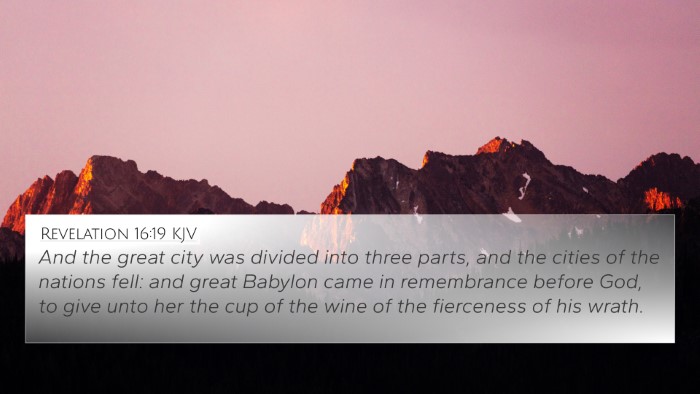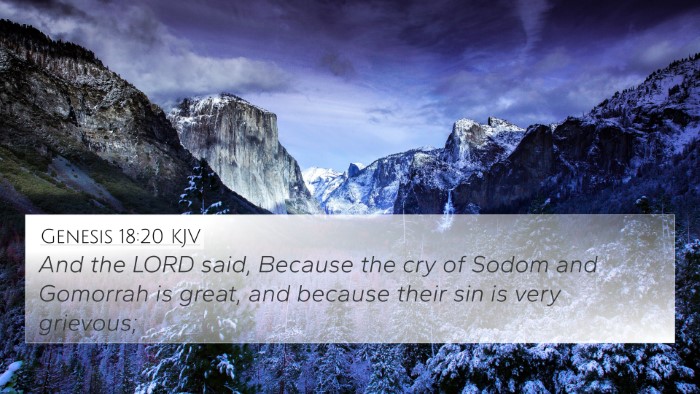Understanding Revelation 18:5
Revelation 18:5 states, "For her sins have reached unto heaven, and God hath remembered her iniquities." This verse speaks to the profound moral and spiritual consequences resulting from the sins of Babylon, a representation of worldly corruption and rebellion against God. The phrase "reached unto heaven" symbolizes the gravity and utter fullness of Babylon's transgressions, prompting divine remembrance and impending judgment.
Insights from Public Domain Commentaries
Matthew Henry's Commentary
Matthew Henry emphasizes the cultural and religious implications of Babylon, suggesting that its sins are not merely individual errors but systemic and habitual offenses against God's holiness. He illustrates how the height of sin reaches its zenith before God's judgment is unleashed, indicating that divine justice is both inevitable and comprehensive. The imagery of “reaching to heaven” conveys how these accumulated sins provoke a divine response.
Albert Barnes' Notes on the Bible
Albert Barnes highlights the urgency of God's remembrance of iniquities in this verse. He notes that God takes ongoing record of sin, which ultimately results in a severe reckoning. The context suggests that the magnitude of Babylon’s sins belongs to a larger narrative of divine retribution, portraying a God who does not overlook wrongdoing but rather moves towards judgment at the appointed time.
Adam Clarke's Commentary
Adam Clarke interprets the idea of sins reaching heaven as a declaration of the universality of God's awareness of human sin. Clarke argues that this verse serves as a warning to nations and individuals alike about the consequences of persistent iniquity. This remembrance is not to be viewed exclusively as punitive; it also serves as a serious exhortation to repentance and reflection on one’s conduct.
Related Bible Cross References
- Genesis 18:20-21: God's recollection of the cries against Sodom illustrates the theme of divine justice concerning iniquity.
- Lamentations 3:59: This verse reflects God's justice in acknowledging wickedness and ensures it is addressed.
- Ezekiel 18:30: A call to repentance highlights God’s readiness to forgive if one turns from sin.
- Romans 2:6: God's judgment will be based on one’s deeds, correlating with the divine reckoning upon Babylon.
- Galatians 6:7: "God is not mocked," reinforces the principle that one will reap what they sow regarding immoral actions.
- Hebrews 10:31: The fear of falling into the hands of the living God underscores the seriousness of His judgment.
- James 5:4: Highlights the Lord’s attention to the injustices of the wealthy, reminding us that nothing escapes His notice.
- Matthew 23:37-39: Jesus laments the city that kills prophets; this connects to the overarching theme of sin and divine remembrance.
- Revelation 16:19: Illustrates the culmination of God’s judgment against Babylon, emphasizing that her sins have consequences.
- Revelation 14:8: Proclaims the fall of Babylon, demonstrating the impact of her sins on both the earth and the heavens.
Thematic Connections in Scripture
This verse serves as a potent reminder that sins, especially collective ones as represented by Babylon, have severe implications. The overarching themes drawn from the cross-referencing of scripture reveal how interconnected the Biblical narrative is regarding God's intention to address human sinfulness. The following thematic connections emerge:
- Judgment: Revelations of God’s ultimate judgment against sin recur throughout scripture, stressing the importance of accountability.
- Divine Awareness: The consistent message that God is aware of sin demonstrates His omniscience and justice.
- Call to Repentance: The repeated emphasis on repentance throughout the scriptures signifies the hope of redemption.
- God’s Sovereignty: The narrative of judgment reinforces the sovereignty of God over nations and individuals alike.
Tools for Cross-Referencing
To further explore the connections between the verses mentioned, one can utilize various tools for Bible cross-referencing. These tools serve as resources for deeper understanding:
- Bible Concordance: A tool that helps locate terms and phrases across scripture, aiding in cross-reference studies.
- Bible Cross-Reference Guide: Provides systematic approaches for identifying related verses.
- Cross-reference Bible Study: Methods that facilitate comparative studies of verses and themes.
- Bible Reference Resources: Comprehensive materials that provide insights on connections between Biblical texts.
- How to use Bible Cross-References: Guides on utilizing thematic links for enriching one's study of the Scripture.
Inter-Biblical Dialogue
The concept of inter-Biblical dialogue is crucial for understanding Revelation 18:5. This dialogue illustrates the cohesive narrative found in scripture regarding sin, judgment, and redemption. For anyone researching connections between Bible verses or looking to draw parallels, this verse can lead to profound insights about God's character and His dealings with humanity across the ages.
Conclusion
The analysis of Revelation 18:5 provides a sobering reminder of the consequences of persistent sin. By employing tools for cross-referencing and exploring thematic connections throughout the Bible, one can gain a holistic understanding of God's justice and mercy, as well as the interconnectedness of scripture. Such insights can enrich the study experience and foster deeper faith and understanding.
